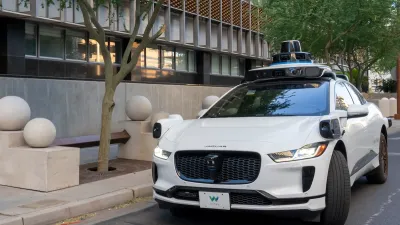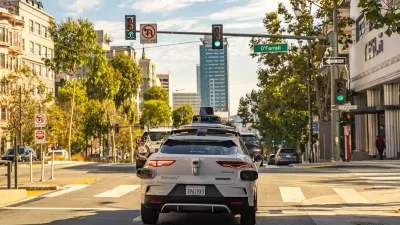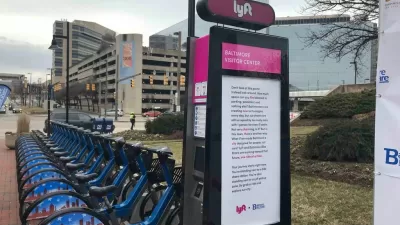You remember the one showing the amount of space occupied by 60 people on a bike, 60 people on a bus, and 60 people in cars? It's also helpful for making a convenient point about Uber and self-driving cars.

Jon Orcutt, communications and advocacy director for Transit center, turned a familiar image on its head this week, posting the following tweet:
— Jon Orcutt (@jonorcutt) June 29, 2016
You'll remember the original image, which Jon Orcutt references with apologies, from Twitter, Facebook, and, yes, Planetizen.
With apologies to the original pic.twitter.com/Wlb3b5IP5k
— Jon Orcutt (@jonorcutt) June 29, 2016
The point is fairly simple: a car is a car, and with the car comes inefficiencies with only theoretical potential for improvements. Ron Kilcoyne made a related point in November 2015 about the potential for autonomous vehicles to explode vehicles miles traveled, and the negative externalities that would come along with that "disruption"—even if congestion isn't one of them.
Regarding transportation network companies, the jury is still out on the effect on congestion of Uber and its brethren, and early efforts to connect TNCs with transit, or paratransit, have yet to prove effective in reducing congestion or pollution.
FULL STORY: Space required to transport 60 people

Study: Maui’s Plan to Convert Vacation Rentals to Long-Term Housing Could Cause Nearly $1 Billion Economic Loss
The plan would reduce visitor accommodation by 25,% resulting in 1,900 jobs lost.

North Texas Transit Leaders Tout Benefits of TOD for Growing Region
At a summit focused on transit-oriented development, policymakers discussed how North Texas’ expanded light rail system can serve as a tool for economic growth.

Using Old Oil and Gas Wells for Green Energy Storage
Penn State researchers have found that repurposing abandoned oil and gas wells for geothermal-assisted compressed-air energy storage can boost efficiency, reduce environmental risks, and support clean energy and job transitions.

Private Donations Propel Early Restoration of Palisades Playground
Los Angeles has secured over $1.3 million in private funding to restore the Pacific Palisades playground months ahead of schedule, creating a modern, accessible space that supports community healing after recent wildfires.

From Blight to Benefit: Early Results From California’s Equitable Cleanup Program
The Equitable Community Revitalization Grant (ECRG) program is reshaping brownfield redevelopment by prioritizing projects in low-income and environmental justice communities, emphasizing equity, transparency, and community benefits.

Planting Relief: Tackling Las Vegas Heat One Tree at a Time
Nevada Plants, a Las Vegas-based nonprofit, is combating the city’s extreme urban heat by giving away trees to residents in underserved neighborhoods, promoting shade, sustainability, and community health.
Urban Design for Planners 1: Software Tools
This six-course series explores essential urban design concepts using open source software and equips planners with the tools they need to participate fully in the urban design process.
Planning for Universal Design
Learn the tools for implementing Universal Design in planning regulations.
Ascent Environmental
Borough of Carlisle
Institute for Housing and Urban Development Studies (IHS)
City of Grandview
Harvard GSD Executive Education
Toledo-Lucas County Plan Commissions
Salt Lake City
NYU Wagner Graduate School of Public Service





























